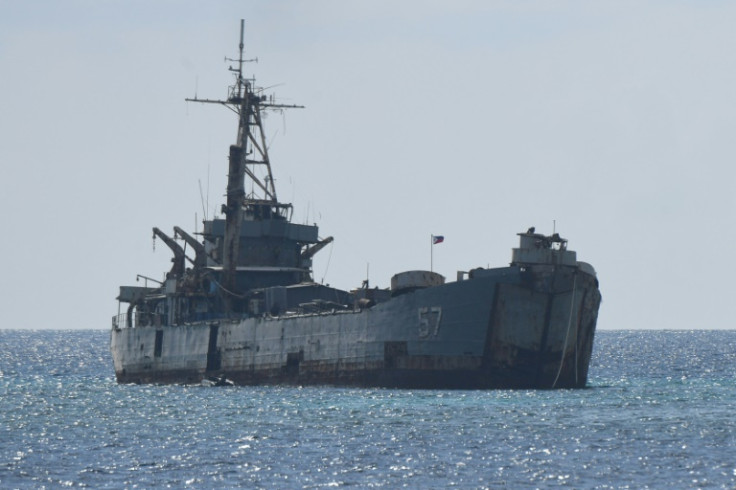China Says Asia Shouldn't Be A 'Boxing Ring' For Power Rivalry After US-Japan-South Korea Summit

KEY POINTS
- A foreign ministry spokesperson said external powers that seek to establish "hegemony" in the region will fail
- The U.S., Japan and South Korea have criticized Beijing's aggression in the South China Sea
- They expressed support for the Philippines in countering China's actions
China has snapped back after the U.S., Japan and South Korea released a joint statement criticizing the Asian powerhouse's advances in the South China Sea.
"The Asia-Pacific region is a promising land for peace and development. It should not be turned into a boxing ring for major power rivalry, still less a battlefield of a cold war or hot war," Chinese foreign ministry spokesperson Wang Wenbin said at a press briefing Monday.
President Joe Biden, South Korean President Yoon Suk-Yeol and Japanese Prime Minister Fumio Kishida agreed to expand security and economic ties between the nations during a summit held at the U.S. presidential retreat of Camp David last Friday. They also criticized Beijing's "unlawful maritime claims that we have recently witnessed" in the South China Sea.
In a statement, the three countries said they "steadfastly oppose the militarization of reclaimed features; the dangerous use of coast guard and maritime militia vessels; and coercive activities" in the region.
In response, Wang said China has "indisputable sovereignty" over the South China Sea islands, which Beijing calls Nanhai Zhudao. Vietnam and the Philippines have overlapping claims in parts of the area, specifically the Paracel Islands (Hoang Sa in Vietnam), Scarborough Shoal (Bajo de Masinloc in the Philippines) and the northeastern section of the Spratly Islands (Kalayaan Island Group in the Philippines).
Wang warned foreign powers that "seek to establish and maintain hegemony in the region are doomed to fail." He reiterated that Beijing rejects the "illegal" 2016 ruling by an arbitral tribunal in The Hague that was overwhelmingly in favor of the Philippines.
Beijing previously slammed the U.S. after the State Department released a statement in support of the Philippines following an Aug. 5 incident at the Second Thomas Shoal (Ayungin Shoal). Washington said any "armed attack" on the Philippines and its troops or vessels would invoke U.S. defense commitments under the Mutual Defense Treaty.
Tensions in the disputed waters escalated in recent weeks after a Chinese Coast Guard (CCG) vessel used a water cannon on Philippine Coast Guard (PCG) boats that were supposed to carry out a resupply mission at Ayungin Shoal, known in China as Ren'ai Reef.
After the incident, China said the CCG responded "in accordance with the law" after Manila repeatedly reneged on a promise to tow away the grounded BRP Sierra Madre from Ayungin Shoal. Philippines President Ferdinand Marcos Jr. has since denied the existence of any such agreement.
I'm not aware of any agreement that the Philippines should remove from its own territory its own ship, the BRP Sierra Madre, from the Ayungin Shoal.
— Bongbong Marcos (@bongbongmarcos) August 9, 2023
And let me go further, if there does exist such an agreement, I rescind that agreement as of now. pic.twitter.com/PrOXMg1bRT
Meanwhile, the U.S. and Japan have consistently expressed support for the Philippines. Manila's security officials said over the weekend that the U.S., Japan and Australia were planning a joint navy drill in the disputed seas to emphasize their commitment to upholding the international rule of law.
South Korea has also expressed interest in elevating Seoul-Manila ties into a strategic cooperation. In February, the two countries held in-depth discussions on defense and security, as well as maritime engagement.
© Copyright IBTimes 2024. All rights reserved.












